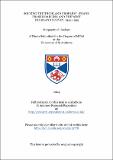Files in this item
Solving the 'Highland problem' : Frank Fraser Darling and the West Highland Survey, 1943-1955
Item metadata
| dc.contributor.advisor | Clark, J. F. M. (John F. M.) | |
| dc.contributor.author | Brokaw, Margaretta S. | |
| dc.coverage.spatial | vii, 132 p. | en_US |
| dc.date.accessioned | 2018-06-06T12:49:26Z | |
| dc.date.available | 2018-06-06T12:49:26Z | |
| dc.date.issued | 2004 | |
| dc.identifier.uri | https://hdl.handle.net/10023/13778 | |
| dc.description.abstract | Between 1944 and 1951, Dr. Frank Fraser Darling conducted the West Highland Survey for the Department of Agriculture for Scotland with grants from the Development Commission. He sought to solve die 'Highland problem', a persistent demographic and economic problem in the West Highlands and Islands with centuries-old roots, but he was disappointed when the Survey failed to influence policy. It was not altogether a failure, however. It was a novel attempt to bridge the gap between the natural and social sciences. Fraser Darling attempted to use ecology to understand and solve the Highland problem, leading him to subtitle the report 'an essay in human ecology'. Reducing the problem to an ecological base, he contended that 'the Highlands are a devastated countryside, and that is the plain primary reason why there are now few people and why there is a constant economic problem'. The theories of Frederick Clements and W.C. Allee made him view the Highlands as a super-organism, the organic and inorganic constituents of which had achieved a delicate equilibrium over centuries. He contended that modern capitalist society disrupted and destroyed this stability through deforestation, the concept of private property, and the market economy. He used the Survey to criticize modern culture and to idealize traditional rural life. For rehabilitation he prescribed conservation as 'applied ecology' to regain eco-stability and cultural evolution to withstand the conforming pressure of modern society. The Survey failed for a number of reasons. The Department of Agriculture was suspicious of Fraser Darling, and his rehabilitative plan was ill-defined and impracticable because it was idealistic and based upon flawed history and science. But, it did not fail completely; it was an early forum for Fraser Darling's environmental philosophy, which later propelled him to great success in North America and Britain. | en_US |
| dc.language.iso | en | en_US |
| dc.publisher | University of St Andrews | |
| dc.subject.lcc | DA880.H6D2B8 | |
| dc.subject.lcsh | Darling, F. Fraser (Frank Fraser), 1903- | en |
| dc.subject.lcsh | Darling, F. Fraser (Frank Fraser), 1903---West Highland survey | en |
| dc.subject.lcsh | Great Britain.--Department of Agriculture for Scotland.--West Highland Survey | en |
| dc.subject.lcsh | Human ecology--Scotland--Highlands | en |
| dc.subject.lcsh | Human geography--Scotland--Highlands | en |
| dc.subject.lcsh | Highlands (Scotland)--Social conditions | en |
| dc.title | Solving the 'Highland problem' : Frank Fraser Darling and the West Highland Survey, 1943-1955 | en_US |
| dc.type | Thesis | en_US |
| dc.type.qualificationlevel | Doctoral | en_US |
| dc.type.qualificationname | MPhil Master of Philosophy | en_US |
| dc.publisher.institution | The University of St Andrews | en_US |
This item appears in the following Collection(s)
Items in the St Andrews Research Repository are protected by copyright, with all rights reserved, unless otherwise indicated.

